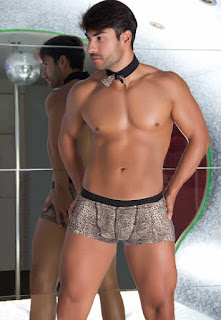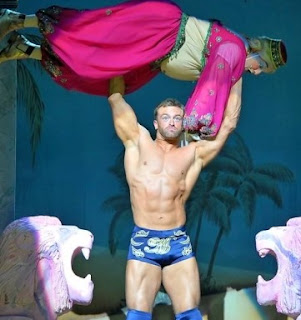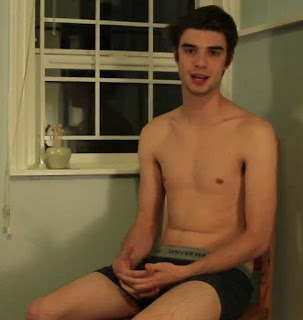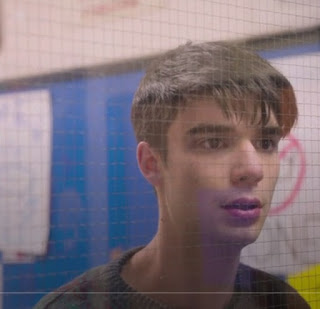I've never seen The Breakfast Club (1985), the Brat Pack classic about five mismatched high schoolers who bond during a Saturday detention. We didn't watch any Brat Pack movies in the 1980s -- too homophobic. I rented it sometime in the 2000s, but the opening scene sows a close-up of Judd Nelson's locker, with the phrase "Keep out, fag!" So I kept out.
Saturday School (2020) on Amazon Prime sounded like a scene-by-scene remake, but in 2020 there would probably be less homophobia, so I decided to watch, to see what all the fuss was about
Prologue: Friday 1:30 pm, a ritzy ultra-modern high school in Australia. Goofball and Hunk discuss the nice ass on passing Dumb Girl. Hunk rushes over and bullies a passing Nerd. Activists approaches and berates them for bullying. Hunk flirts with her, but she finds him "arrogant" (movie code for "sexy, but I don't want to admit it).
Week 1: Goofball, Hunk, Nerd, Dumb Girl, and Feminist standing outside the school. A little girl ridicules them for being stupid enough to require "Saturday School."
Whooops, she just looks 12. She's actually the teacher in charge of their punishmnet. Activist calls her out for her abuse -- not appropriate for a teacher talking to students! -- so she redoubles her scorn of the "shitheads." If she had her way, they'd be slowly turtured to death instead of just getting work assignments.
Geez, did they blow up the World Trade Center? No, they were in the vicinity of a purse that got stolen.
Literally trembling with rage, Psycho Teacher passes out the ice breaker game: you have to decide which of three statements about her is true: "I'm sober right now, I marrie dmy cousin, I love my job." Must be marrying the cousin.
Break time: Activist flirts with Hunk, Dumb Girl flirts with Goofball, Psycho Teacher, now too drunk to be enraged, flirts with Nerd. He says he doesn't like girls. She doesn't understand; she's never heard of gay people before. "What are you going to do when it's time to have kids?" "I don't think they'd fit out of my arsehole, Psycho Teacher."
The others return. Psycho Teacher tries to humiliate Nerd by outing him, but they aren't homophobic (the bullying before wasn't about that). Then she sends them home.
Wait -- they had five minutes of ridicule, then a break. What happened to the work assignments?
I'm rooting for these kids. Six weeks of abuse by Psycho Teacher!
Week 2: They're writing essays explaining why they should be found not guilty of the heinous crime. Psycho Teacher has passed out drunk (Thank God!), so they sneak off to play "Truth or Dare": "Take off an article of clothing": "Kiss Hunk." Three kids, including Nerd, get that one, but they all refuse to kiss him.
Week 3: Psycho Teacher has a new game: a mock trial, with everyone in drag to humiliate them. But the boys aren't humiliated by dresses and wigs. They play up the sexual double standards: girls get called "sluts" for doing it, and boys get called "lames" for not doing it.
Hunk gets upset and runs off. He confesses to to Activist that he lives with his aunt, who is obviously guilty of child neglect, if not abuse. Sometimes he has to scrounge in dumpsters for food.
Later, they are taking a test. Goofball wants to know why Nerd is still in drag. Psycho Teacher explains: "The boy likes rainbows." Homophobe!
Next Psycho Teacher makes them run laps. Nerd rebels because "Black people don't run." Huh?. Then he calls out Hunk for his bullying: "You beat me up to make yourself look good!"
Yerba Buena High School? Is there really a Yerba Buena in Australia?
Next: a water-balloon fight and argument over which boy should hook up with which girl. Turns out to be Goofball-Dumb Girl and Hunk-Activist. Nerd is running laps by himself (We're not homophobic, but you're the only gay guy in Australia, so....)
Week 4: An improv game. (At least Psycho Teacher is more mellow when she's drunk). Nerd plays a guy who discovers that his wife is pregnant, but he don't want no kids. Especially boys. He starts crying -- abusive Dad issues coming out. Hunk leads him off for a heart-to-heart.
Week 5: Writing poetry. Psycho Teacher reads Nerd's aloud to the group: "Dear Love, I see you, but you don't see me. I bang on an invisible wall. but I am silent to you." Goofball and Hunk get upset and storm off. I don't know why.
Psycho Teacher flirts with him: "If you asked her, you might find that she likes you, too." He protests that he doesn't like girls, but she dismisses him. There is no such thing as being gay; every boy likes girls. How else are they going to have kids? Nerd just has to be "true to himself." Wow, coming out as straight! That's a switch! An intensely homophobic one, but a switch.
Meanwhile, Hunk and Activist are also arguing about "being true to yourself.," and Goofball steals a page from Activist's diary.
Next, another "Revealing Secrets" game. Geez, they keep promising to reveal secrets, but never do.
Week 6: They have an "Australian Idol" singing contest.
Week 7: Wait, I thought there were just six weeks. Psycho Teacher gets back to the "who stole the purse" bit. Goofball accuses Hunk. They fight. Then, big reveal: Nerd filmed Activist taking it. Then why go through all of this nonsense? Activist starts to cry.
Week 8: This is lasting longer than it should, with unclear motives, secrets that don't get revealed, and advice to "be true to yourself" without any pay-off. Still 18 minutes to go.
No one is speaking to each other. Hunk runs off. Nerd follows. To advise him to be true to himself?
Hunk goes into the school (nice mural, but why the American Civil Rights leaders in Australia?).
Nerd has a date with Dumb Girl, and suggests that they double. Hunk could invite Activist.
I feel sick to my stomach.
I'm out. I don't even want to stick around to look for beefcake photos for illustrations. Here are some cute kittens.
This is the most homophobic movie I've ever seen.












































































